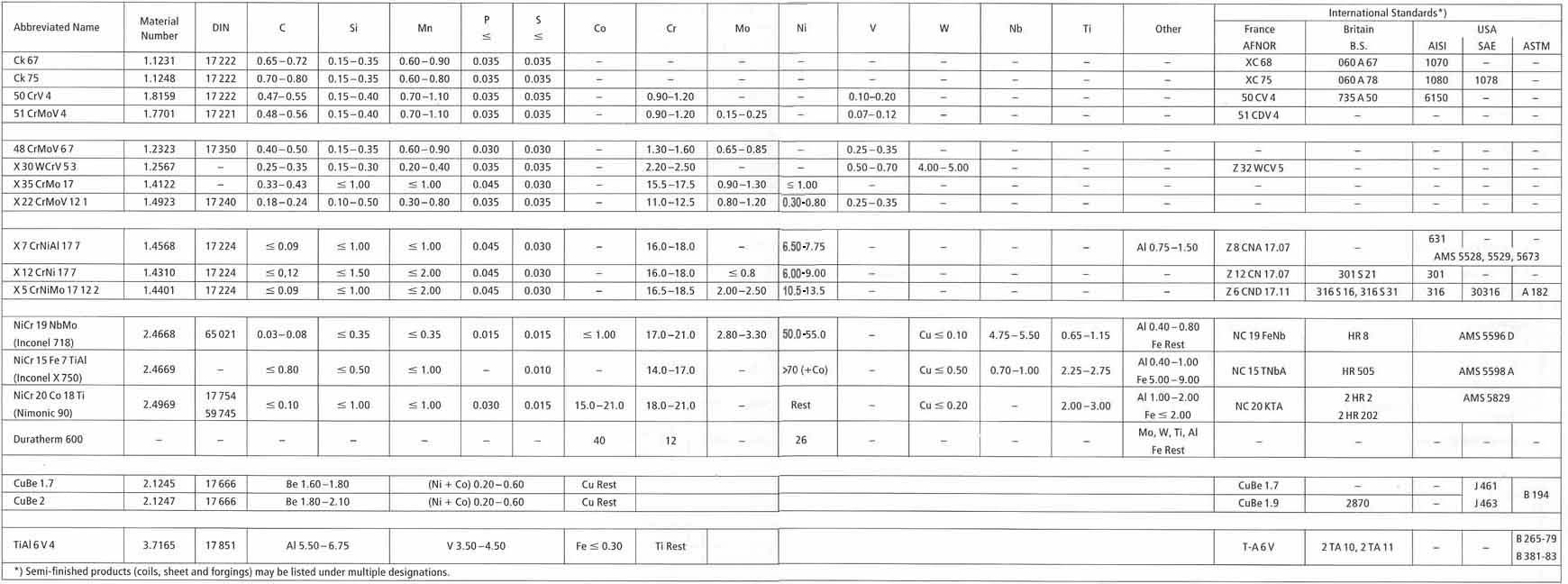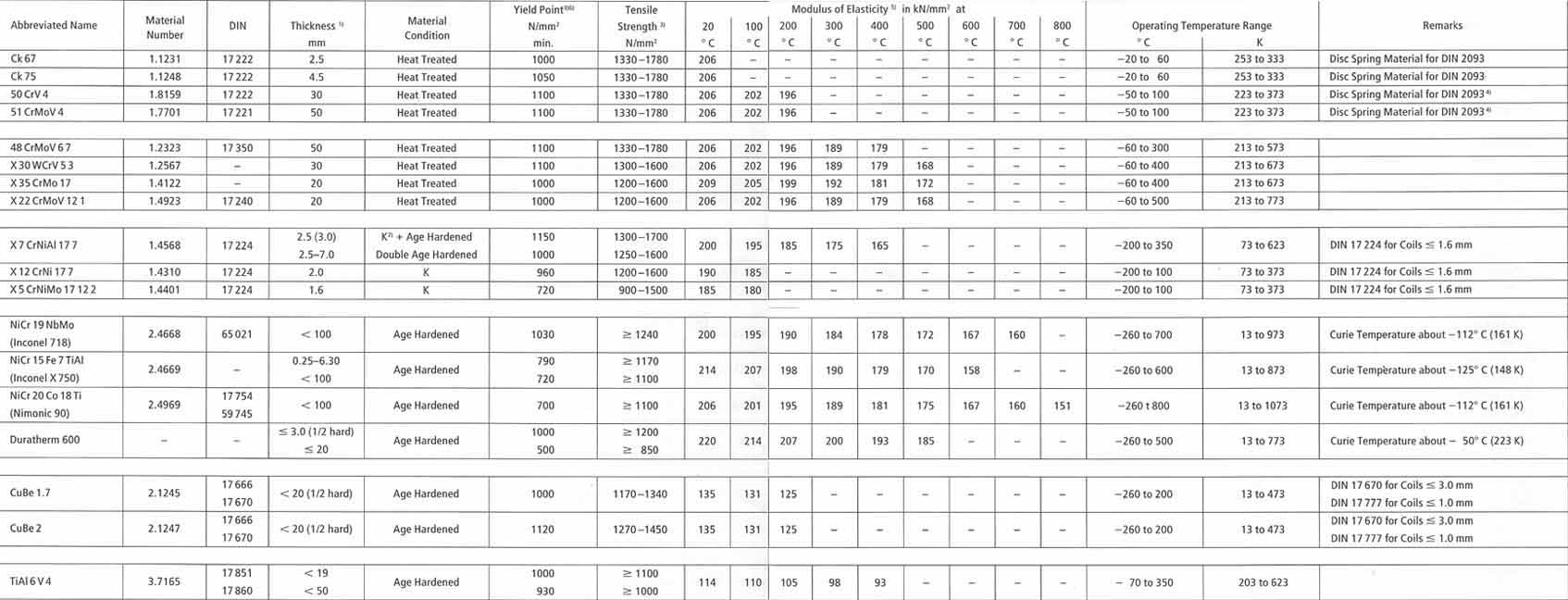MATERIALS
There is a wide variety of materials with accentuated different mechanical properties compared to to standard steel springs. From different types of stainless steel that can withstand corrosion, other special steels used to withstand extreme temperatures or both factors simultaneously. While calculating you must take into account these differences. You may contact us if you require help on this or other aspects. Based on the selected material the belleville washer may work in negative temperature -400ºF and up to 1400ºF . Positive Non-magnetic properties and corrosion resistance are other key aspects when deciding on the material.
These are the main materials available:
Materials
- Steels for disc springs DIN 2093 / DIN EN 16983
- Stainless Steels
- Heat resistant steels
- Special alloys (anti-corrosion and non-magnetic)
- Description of materials of disc springs for valves
- Description of materials in flange washer disc springs
- Additional protection against corrosion
- Chemical composition of materials of Disc Springs
- Material properties of Disc Springs
1. Steels for disc springs DIN 2093 / DIN EN 16983
- AISI 1070 (CK67) / DIN 1.1231/ ASTM 1070
- AISI 6150 (50CrV4) / DIN 1.8159 / ASTM 6150
2. Stainless steels
These materials have a lower module of elasticity in comparison to the materials in section 1. You must consider this on your calculations.
- AISI 301 / DIN 1.4310
- AISI 316 / DIN 1.4401
- AISI 631 / DIN 1.4568
3. Heat resistant steels
| 1. 48CrMoV6-7 | (DIN 1.2323) | supports up to 550ºF |
| 2. X7CrNiAl17-7 | (DIN 1.4568) | supports up to 600ºF |
| 3. X30WCrV5-3 | (DIN 1.2567) | supports up to 700ºF |
| 4. X39CrMo17-1 | (DIN 1.4122 X35CrMo17) | supports up to 800ºF |
| 5. X22CrMoV12-1 | (DIN 1.4923) | supports up to 900ºF |
By using these steels, take into account that the stresses which occurs in the cup spring with these materials, is in relation to the lower force offered by these steels at the higher temperatures, otherwise, a relaxation of spring would occur, superior to the ratios allowed. Furthermore it should be noted that the modulus of elasticity of all the materials decreases as the temperature arises. As a rule, a redesign of the cup spring may be necessary.
4. Special alloys (anti-corrosion and non-magnetic)
| Inconel 718 AMS 5596 (DIN 2.4668) | supports up to 1.250ºF |
| Inconel X750 AMS 5598 (DIN 2.4669) | supports up to 1.100ºF |
| Duratherm 600 (Co 40, Ni 26, Cr 12, Mo, W, Ti, Al, Bal, Fe) | supports up to 900ºF |
| Nimonic 90 AMS 5829 (DIN 2.4969) | supports up to 1.400ºF |
With these materials, while dimensioning the Belleville, you should also consider permissible stresses, depending on temperature and working conditions.
All special alloys relating therefore, are exceptionally resistant to corrosion by multiple agents. Additionally they are non-magnetic, which is of utmost importance in electro technical applications.
5. Description of materials of disc springs for valves
17-7 PH – Stainless Steel (ASTM A693 , AMS 5528)
Thermal Range : -400ºF to 600ºF. For both: indoor and outdoor, and for use in corrosive atmosphere. Not recommended for applications in environments with hydrochloric or hydrofluoric acids. For this reason Nickel silver coating is recommended for applications near marine environments. Suitable for cryogenic applications, Magnetic Surface Finish: All washers are proven in height and free of burrs.
AISI 301 – Stainless Steel (ASTM A666 , AMS 5519)
Thermal Range : – 400ºF to 200ºF. For both: indoor and outdoor, and for use in corrosive atmosphere. Slightly magnetic. Surface Finish: All washers are proven in height and free of burrs.
Inconel 718 (ASTM B637)
Thermal Range : -400ºF to 1.250ºF. For indoor and outdoor high temperature and corrosive atmospheres. NON – MAGNETIC . Surface Finish: All washers are proven in height and free of burrs.
6. Description of materials in flange washer disc springs
17-7 PH – Stainless Steel (ASTM A693, AMS 5528)
Thermal Range: -400ºF to 600ºF. For both indoor and outdoor and for use in corrosive atmosphere. Not recommended for chloride or fluoride applications. A Nickel silver coating may be advisable if used near marine environments. Suitable for cryogenic applications. Magnetic. Surface Finish: All washers are proven in height and free of burrs.
Inconel 718 (ASTM B637)
Thermal Range: -400ºF to 1.250ºF. For high temperature and corrosive atmospheres. Indoor and outdoor service. NON-MAGNETIC. Surface Finish: All washers are proven in height and free of burrs.
H-13 Tool Steel (ASTM A681)
Thermal Range: -250ºF to 1.100ºF. For indoor and outdoor jobs. Suitable for high temperature environments. Magnetic. Surface Finish: Machined and lightly greased / oiled.
7. Additional protection against corrosion
As a complement to the material, or sometimes even as an alternative, different types of coatings may be applied to the finished disc spring. This will provide greater protection from corrosion.
Feel free to check for other materials that may meet your requirements.
In the following tables you will find more specific information for each item:


